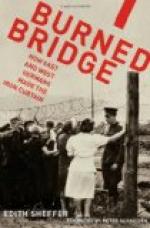That winter and the summer which followed, and the period which carried him into the spring of 1916, was materially a triumphal procession for Wes Thompson. Tommy’s forecast of the war’s ending had fallen short as so many other forecasts did. The war went on, developing its own particular horrors as it spread. But the varying tides of war, and the manifold demands of war, bestowed upon Vancouver a heaping measure of prosperity, and Vancouver, in the person of its business men, was rather too far from the sweat and blood of the struggle to be distracted by the issues of that struggle from its own immediate purposes. Business men were in business to make money. They supported the war effort. Every one could not go to the trenches. Workers were as necessary to victory as fighters. People had to be fed and clothed. The army had to be fed and clothed, transported and munitioned. And the fact that the supplying and equipping and transporting was highly profitable to those engaged in such pursuits did not detract from the essentially patriotic and necessary performance of these tasks.
The effect on Vancouver was an industrial rejuvenation. Money flowed in all sorts of channels hitherto nearly dry. A lot of it flowed to Wesley Thompson in exchange for Summit cars. Thompson was like many other men in Vancouver. He was very busy. The business stood on its feet by virtue of his direction. If he dropped it and rushed off to the war—well there was no lack of men, men who had no particular standing, men who could not subscribe to war charities, to Dominion war-bond issues. There was plenty of man-power. There was never a surplus of brain-power. Business was necessary. So a man with a live, thriving business was fighting in his own way—doing his bit to keep the wheels turning—standing stoutly behind the fellow with a bayonet. And a lot of them let it go at that. A lot of them saw no pressing need to don khaki and let everything else go to pot. A lot of them were so intent upon making the most of their opportunities that they never brought their innermost thoughts out on the table and asked themselves point-blank: “Should I go? Why shouldn’t I?” And there were some who saw dimly—as the months slid by with air raids and submarine sinkings and all the new, terrible devices of death and destruction which transgressed the old usages of war—there were some who were troubled without knowing why. There were men who hated bloodshed, who hated violence, who wished to live and love and go their ways in peace, but who began uneasily to question whether these things they valued were of such high value after all.
And Wes Thompson was one of these. Deep in him his emotions were stirring. The old tribal instinct—which sent a man forth to fight for the tribe no matter the cause—was functioning under the layer of stuff that civilization imposes on every man. His reason gainsaid these stirrings, those instinctive urgings, but there was a stirring and it troubled him. He did not desire to die in a trench, nor vanish in fragments before a bursting shell, nor lie face to the stars in No Man’s Land with a bayonet hole in his middle. He would not risk these fatalities for any such academic idea as saving the world for democracy.




